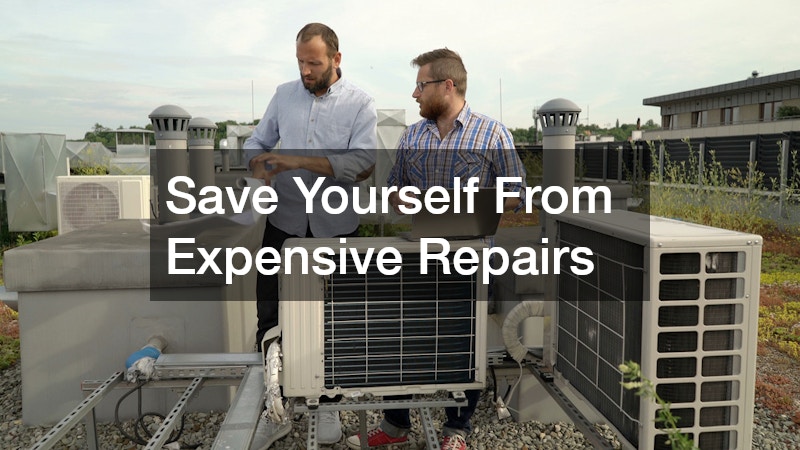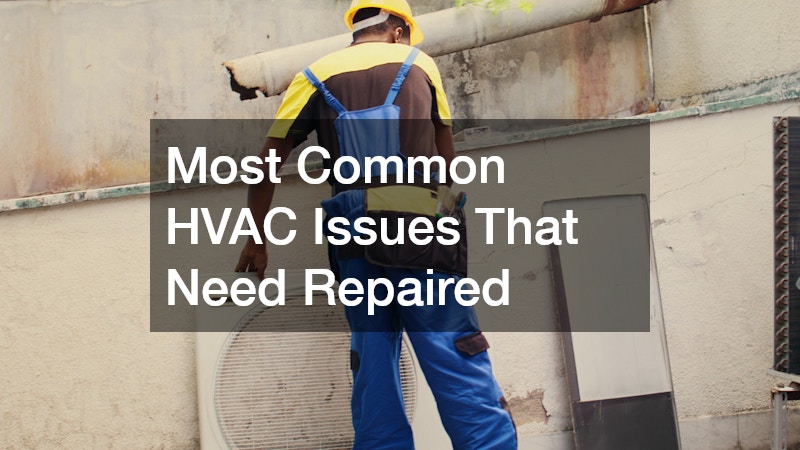In this article, we will explore the most common HVAC issues that homeowners and businesses face. These issues can range from minor inconveniences to potentially costly repairs if not addressed in a timely and professional manner. Relying on a trusted local HVAC repair service can make all the difference when these problems arise, ensuring that your system remains efficient and reliable. Understanding these common problems and knowing how to address them is key to maintaining a comfortable environment and efficient system performance.
1. Why is My HVAC System Not Heating or Cooling Properly?
1.1. Thermostat Malfunctions
Thermostat issues can cause significant discrepancies in temperature control. Often, malfunctions result from incorrect settings or malfunctioned sensors, which can lead to an uncomfortable environment and increased energy bills. Adjusting or recalibrating the thermostat may solve some issues, but sometimes replacing the unit is necessary. Often overlooked, switching out old batteries in digital thermostats might also restore proper functionality. It’s crucial to ensure the thermostat is installed in the right location, away from direct sunlight and drafts. Placement mistakes can result in inaccurate temperature measurements, leading to unnecessary HVAC operation.
1.2. Clogged Filters
Clogged air filters can significantly reduce the efficiency of your HVAC system. Over time, filters collect dust and debris, which obstructs airflow and forces the system to work harder than necessary. Manufacturers typically recommend checking filters every month and replacing them every three months. However, frequency could increase if the home has pets or residents with allergies. Failure to replace clogged filters can strain the system, potentially leading to overheating or failure of components. Cleaning or replacing filters can improve air quality and extend the system’s lifespan.
2. What Causes My HVAC System to Make Strange Noises?
2.1. Loose or Damaged Components
Noises such as banging, rattling, or clicking can indicate loose components or even damage. These sounds often mean screws, bolts, or panels are not properly secured, which can escalate into more severe damage. Regular inspections and maintenance can help identify and tighten loose components before they cause more significant problems. Additionally, it’s essential to address these issues promptly to avoid operational inefficiencies. Ignoring such noises may lead to costly repairs or replacements down the line. By taking action at the first sign of trouble, homeowners can prevent the situation from worsening.
2.2. Motor or Compressor Problems
Grinding or squealing noises can point to motor or compressor issues. Such sounds indicate lubrication problems, worn components, or a mismatch in moving parts within the compressor or motor. Immediate professional assessment is necessary to avoid further damage. Failure to address the problem can result in complete system failure, necessitating expensive replacements. Regular maintenance schedules, including inspections for wear and tear, are vital in prolonging the lifespan of motors and compressors. Timely intervention can mean the difference between minor repairs and costly replacements.
3. How Can I Improve HVAC System Efficiency?
3.1. Regular Maintenance
Regular maintenance is critical for system efficiency. Simple tasks, like checking refrigerant levels and cleaning coils, can enhance your HVAC system’s performance. Scheduling biannual professional inspections ensures components are in good working order, catches potential issues early, and keeps the system running smoothly. Many HVAC companies offer maintenance plans to make this process more convenient. Consistent maintenance not only improves efficiency but also extends the lifespan of the system. Efficient systems save energy and reduce operational costs over time.
Many homeowners also benefit from learning how to repair heating and air conditioning for minor issues, which can prevent bigger problems. Simple tasks like replacing clogged filters, tightening loose belts, or cleaning condenser coils can improve system efficiency and reduce wear and tear.
3.2. Upgrading to Modern Systems
Consider upgrading to a modern HVAC system to enhance energy efficiency. Newer systems often meet higher energy standards, which can lead to considerable savings on utility bills. Modern HVAC units boast smart technology, allowing for greater control over environmental conditions and energy usage. They also offer improved filtration systems that significantly enhance indoor air quality. Weighing the initial investment against long-term savings and improved performance is critical. It might be a worthwhile investment for homeowners looking to reduce their carbon footprint and improve home comfort.
4. Why is There Water Leaking from My HVAC System?
4.1. Blocked Drain Lines
Condensation can lead to leaks if drain lines are blocked. Over time, algae and mold can block drain pipes, preventing proper water drainage from the unit. Clearing blocked drain lines periodically with a simple solution of water and vinegar prevents clogs and associated leaks. A professional service can also flush the system to ensure all blockages are addressed. Ignoring blocked drain lines can lead to water damage around the unit and reduced efficiency. Catching and resolving these issues early can prevent serious home damage and potential health risks.
4.2. Refrigerant Leaks
Refrigerant leaks can cause water to drip around the system, leading to performance issues. Insufficient refrigerant levels not only compromise cooling but can cause frosting and subsequent leaks. Careful observation for signs of refrigerant leaks, like reduced cooling efficiency or hissing noises, is crucial. Professional services can identify and repair leaks, resolving the cooling issues and preventing environmental harm. Taking prompt action ensures the HVAC system runs effectively and helps to avoid further costly damage. It also ensures regulatory compliance by preventing harmful refrigerant escape into the environment.
Addressing HVAC issues promptly can save you from expensive repairs and ensure your system runs optimally. Regular maintenance and timely upgrades can significantly extend the life of your HVAC system, providing comfort and efficiency for years to come.




